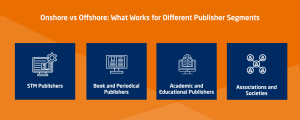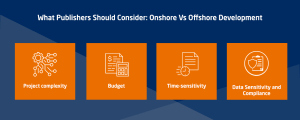 22 January 2026 · Articles
22 January 2026 · Articles
Onshore vs Offshore Development: What Works for Publishers?
The global digital publishing market is projected to reach $402 billion by 2032, proving technology’s role as a core business enabler rather than just a support system. Today’s publishing ecosystem thrives on platforms that deliver content seamlessly across devices. Whether it’s releasing a new journal submission platform, transforming a content management system, or building a mobile-first learning experience, a key dilemma publishers face is choosing between Onshore and Offshore development.
The right answer isn’t universal. Each approach brings distinct advantages and trade-offs. The key lies in understanding which model aligns with your business goals, budget, and operational priorities.
What Publishers Should Consider: Onshore Vs Offshore Development
1. Project complexity
Projects such as developing a journal submission platform, integrating features into CMS or CRM, and designing and planning interactive content modules are part of an agile development approach that involves active collaboration from stakeholders to discuss challenges, gain deep domain knowledge, report updates, and track progress.
Complex projects demand constant collaboration and decision-making agility. Here onshore providers seem to be more viable than offshore due to geographical convenience, but we have a lot of collaboration platforms that offer 24/7 access. Also, for high-investment businesses, having a hybrid approach works best.
2. Budget
For high-investment projects that require resources with specific skill sets and intermittent requirements, for example, feature integration in CRM, here offshore development seems to be the most cost-efficient approach. You can easily scale resources and achieve a good ROI.
While offshore development gives more competitive pricing, it’s the quality, reliability, and speed of execution that decide true ROI.
3. Time-sensitivity
The publishing industry works under strict publication timelines or annual calendars, where time is everything. Working in the same time zone is crucial due to the key underlying factors like frequent communication, rapid feedback, or collaborative workshops.
Whereas budget projects require quick upscaling of resources, especially during new product launches, migrating large content data, or supporting high-traffic platforms. Offshore partners also offer 24/7 development cycles by operating over all time zones. Here, zone differences might cause obstacles without mature processes and clear communication.
4. Data Sensitivity and Compliance
Scientific journals, educational platforms, and member-based platforms consist of sensitive data like research, user credentials for role-based access control, and other sensitive data that must be protected against malicious activities. These platforms must comply with region-specific regulations (e.g., GDPR, HIPAA, and accessibility standards). Here, onshore developers grab confidence due to security concerns. Offshore development can still be an option for publishers, provided they enforce strict security and compliance measures such as clear data handling protocols, secure infrastructure, and active oversight to mitigate compliance risks.
Onshore vs Offshore: What Works for Different Publisher Segments
Above mentioned are some of the non-negotiable factors that publishing organisations should consider while choosing between an onshore and offshore development company. Now let’s understand the pros and cons of both the development company options for each category of publishing companies.

1. STM Publishers
Scientific, technical, and medical publishers rely on complex editorial workflows, integration with global databases, and strict security and compliance regulations.
Onshore Teams: Onshore teams are better for projects that require active collaboration, like creating platforms for reviewing research systems or managing confidential scientific data. As they belong to the same region, they better understand the local laws and publishing rules, making it easier to comply with the regulatory standards.
Offshore Teams: are highly effective for regression testing, feature development, and performance tuning as they provide scaling of resources and 24/7 support.
2. Book and Periodical Publishers
Traditional publishers are transitioning from paper to digital platforms, heavily depending on content management systems, e-commerce platforms, and mobile reading apps.
Onshore Teams: Onshore teams are ideal for ideal during planning stages like initial business analysis and user experience strategies to align product development with regional market demands.
Offshore Teams: Offshore teams are cost-effective and reliable for CMS development, content migration, eCommerce integrations, and quality assurance tasks.
3. Academic and Educational Publishers
Platforms in this segment should scale to a large number of users, high volumes of content, and support high loads during peak hours.
Onshore Teams: Onshore teams are more suited for these publishers as they have a deeper understanding of the local education rules, accessibility needs, and how students interact with the learning platforms.
Offshore Teams: Offshore teams are great for engineering the technical issues of the platform quickly and efficiently. They can handle complex backend systems, integrate and develop new features, and develop mobile apps.
4. Associations and Societies
Associations and Societies rely on digital systems to manage memberships, organize events, and drive engagement for potential customers.
Onshore Teams: Onshore teams are highly in demand for member-focused systems and event platforms. Geographical feasibility fuels the reasonability for developing these platforms as they demand a nuanced understanding of user behavior and stakeholder inputs.
Offshore Teams: Offshore teams are highly suitable for developing reusable components like mobile applications, and award systems and developing backend processing components like reporting dashboards.
Conclusion
For publishers, the choice between onshore and offshore development depends on balancing collaboration needs, cost, speed, and data sensitivity.
Many leading publishing organizations now prefer a hybrid approach — leveraging onshore expertise for strategy and compliance, while tapping into offshore agility for development and scaling.
In the end, the best model is not one-size-fits-all — it’s the one that helps you deliver quality content faster, maintain compliance, and optimize your technology investment.
About Us
NEC Software Solutions India is a trusted technology partner to global publishers (STM & general publishers), academic societies, and associations. We specialise in delivering tailored digital solutions that streamline publishing operations, enhance user experiences, and support content accessibility across platforms. With deep domain expertise and more than 20 years of experience, we help publishing organizations adapt to evolving market needs and deliver greater value to their communities.
Our approach is built on two key pillars: strong service delivery grounded in proven methodologies, a deep understanding of the publishing ecosystem that drives innovation and best practices.
To know more about our publishing services, email us at india.marketing@necsws.com.




